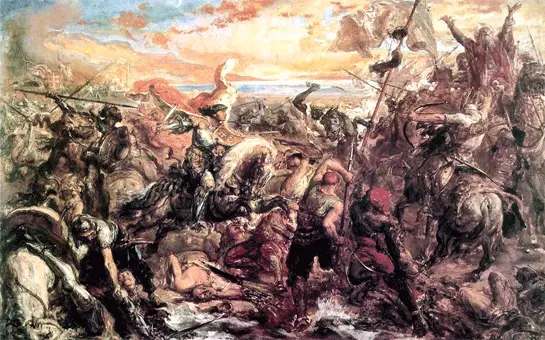The Second Kosovo War, a pivotal conflict in the late 14th century, marked a significant turning point in the history of the Ottoman Empire and the Balkans. This war, fought between the Ottoman forces and a coalition of Christian states led by the Serbian Despotate, was not just a battle for territorial control but a clash of civilizations and ideologies. The consequences of this war were far-reaching, influencing the political, social, and cultural landscape of the region for centuries. In this article, we delve into the intricate details of the Second Kosovo War, exploring its causes, key events, and the profound impact it had on the Ottoman Empire and its adversaries.
The Second Battle of Kosovo took place in 1448 between the Ottoman and Hungarian armies and resulted in an Ottoman victory. This war consolidated the Ottoman dominance in the Balkans and gained respect in the Islamic world by breaking the resistance in Europe. The results of the war paved the way for the expansion of the Ottoman Empire.
Second Kosovo War
The Second Battle of Kosovo took place in 1448 between the Ottoman army led by Sultan Murad II and the Hungarian army led by Janos Hunyadi, and ended with the victory of the Ottoman army.
Background of the War
Despite the significant victory of the Ottoman army in Varna, the rebellions in Wallachia, Mora and Albania increased the hope of the Christians in Europe to form a Crusader Army and expel the Ottomans from the Balkans. The Crusader Army of 70,000 men, formed under the leadership of Hunyadi Janos, set out from Pest. The aim was to first occupy Serbia and then raid the Ottoman army in front of Kosovo. Sultan Murad II, who was informed of these plans, formed an army of 60,000 men and arrived in front of Kosovo. The encounter between the two forces was only a matter of time.
Development of the War
The war, which began with light skirmishes on the morning of October 18, 1448, escalated at noon with the Crusader army’s attack from three wings; however, the Crusader army could not achieve any results from this attack. Janos Hunyadi’s troops, who launched another attack at night, were repelled for the second time. The Crusader army, which launched a new attack on the morning of the second day, suffered great losses in the face of Sultan Murad II’s war strategy. Murad II, who ordered the troops on both wings to retreat against the attacking Crusader army, ordered the Janissary and Azap forces, which were the central forces, to remain in place. When the Crusader army, seeing the withdrawal of the flanks, launched an attack from the wings, thinking that they would win the Second Battle of Kosovo, the Azap and Janissary forces retreated a little and the flanks surrounded the Crusader army with a sudden maneuver. Realizing that he would be defeated at this time, Hunyadi Janos fled the battlefield.On the morning of October 19, the Ottoman army won a decisive victory when the last barricades set up by the Crusaders were demolished. The Second Battle of Kosovo was one of the bloodiest and most difficult battles during the founding period of the Ottoman Empire.
Results of the Second Kosovo War
- Having failed against the Ottoman soldiers for the sixth time, the European alliance’s hope of victory was over.
- European states accepted the Ottoman presence in the Balkans.
- The Ottomans gained great respect in the Islamic world.
- It was the last battle the Crusaders fought to save Istanbul.
- After this war, Europe went on the defensive while the Ottomans went on the offensive.
Importance and Effects of Kosovo II War
The Second Battle of Kosovo was an important event that consolidated the Ottoman Empire’s dominance in the Balkans and led to the collapse of resistance against the Ottomans in Europe. With this victory, the military power and strategic skills of the Ottoman army were proven once again, and their reputation in the Islamic world increased. In addition, resistance to the advance of the Ottoman Empire in Europe decreased after the war, and the Ottomans had the opportunity to further expand their conquests in the Balkans.
Conclusion
The Second Kosovo War and its aftermath reshaped the geopolitical dynamics of the Balkans, solidifying the Ottoman Empire’s dominance in the region. The victory at Kosovo Polje not only expanded Ottoman territories but also established their influence over the Balkan states, paving the way for further conquests into Europe. The war’s consequences were felt for generations, as it altered the course of history for both the victors and the vanquished. Understanding this conflict is crucial for comprehending the complex history of the Ottoman Empire and its enduring legacy in the Balkans.
